Across our member companies, trailblazing OutLEADERS are using their voices to create more inclusive and welcoming workplaces for all. Out Leadership spoke with Sarah Schueddekopf, Head of R&D Personal Care BNX, DACH, NDC, Unilever, who shared her experience as a senior OutLEADER at Unilever:
I transitioned within Unilever quite some years ago and there were hardly safe spaces in society or in the company area. I was afraid of the reaction of people when telling and showing my real me – there was no safety net established.
Going through the process in the factory environment here in Germany was a real surprise to me. I was “confronted” with more acceptance and help than anticipated. Then I heard about an existing network in the United States – my boss told me – which I could connect to. I was no longer alone. And I think this is the great thing in Unilever, that you are not alone, we are many, sometimes you have to show up and speak up to find. But that emptiness is history in Unilever now as we have quite a strong ProUd network, globally and I was initiating a local one for Germany, Austria, and Switzerland. To give space, to let people breathe, and to celebrate diversity, stretching stereotypes into a multidimensional room. We launched it on Valentine’s Day, as love has many colors. And this is being seen, respected, and valued. One could say that it doesn’t matter who I am at work but it DOES!
The culture in Unilever I would say is a culture of inclusion. This is a strong foundation where people within the company can grow, build on, and thrive. If you want, you can move the needle, make the difference – and that’s amazing.
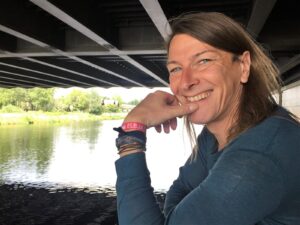

Before my professional life, I always wanted to be a musician. I felt the freedom to operate, to make expression a profession. Learning saxophone and improvisation brought up a lot and there was always the feeling that I didn’t want to play music composed by others as I couldn’t project myself into it. At least in my music, I wanted to be authentic. Listen on Spotify 😊
So what to study – if I had gone for music I would have needed to run exercises of historic reach, compositions, etudes – would it shut me down? Therefore, it was more reasonable to study food engineering which is safer from a personal perspective as well as remuneration – humans always need to eat, so even in crisis. That decision kept my language in music open and I am really happy about that.
So, to put it simply: a lot. Before I transitioned, I felt like a flat battery, as I wasn’t me. Compliments and recognition didn’t register with me. In addition, it took a lot of energy to suppress who I really was or am, and to deliver my tasks and duties. Doing these in isolation limited my full expression of creativity, joy, and passion. It felt like I was stumbling.
My motivator in business life at that time was “always up for a challenge” – a challenge to whom? To me, to dig deeper into what I can find. Similarly, I did two Ironmans to find out that failing is not a problem and “just” an experience to motivate me to be “better” next time.
There is another side impacting my business life. I worked under the assumption that due to my personality, I always needed to deliver more and be better in order to have a safe occupation. Stereotypes in German society at that time were a lot like raising problems, losing jobs, being without work… an outsider in society. There was a silent tremor in my body always asking to be satisfied with a bit of security, which was nurtured by performance. In the end that brought me to start a ProUd network for the business unit I work for (in Germany, Austria, and Switzerland). Creating space and a safer ground for people.
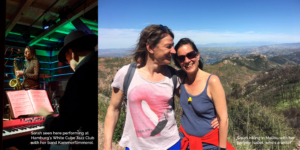

I think my boss in packaging, Juergen. I complained to him that engineering can be so boring and I wanted more excitement: talking to designers, designing technology for people, and understanding people to be able to translate that into new technology. He listened, saw my passion, and gave me the freedom to try new ways. He gave me the confidence to show up and earn resonance – and that should be multiplied by all leaders!
Earlier I needed to fulfill social service – instead of military service – which I did in an institution for handicapped children. Their way of living, their way of expressing themselves, and their love for others taught me to stretch my life concepts. At that time there was no concept about who you are, just that you are. Still, I am deeply grateful for that experience.
And then Berlin, must say, West Berlin as I began to live there before the reunion. A city completely isolated and people living side by side, poor and rich, artists and finance people, just having one interest: to make life better within the boundaries of West Berlin, because there was no escape without the procedure of border control. And then ‘89, knocking down the wall with so many, being there at the heart, was quite symbolic for me. Walls are built by others and it is your own responsibility what you do with that.
I was part of the cultural scene with Off-theater and experimental music. In a way an exciting concept of freedom. The concept of difference, diversity, and inclusion, however you want to call it, is a paradox and nurtures itself. So what I notice is differentiation in a stereotypical world, rather than appreciating and embracing the newness, the different expression. And these people who live this way are a huge influence on me.

There is not a single most important thing to learn, I listened to my professor at university who taught us to understand the structure behind the appearance of facts, the driver, the motivations, and the system of impact. I strongly believe that these help us look at things without prejudice or preconception. Both would do harm to your own creativity and curiosity. And for me, that would mean that there is no movement, no development. Sometimes it feels exhausting to look at things like this but helps to shape and innovate in much broader terms. So, what is needed for this to bloom? I think this is space and a safe feeling, a feeling of respect, curiosity, and will to understand what you haven’t understood before. In essence, this forms a circle of growth or better a spiral of growth where things might not change but your perspective.
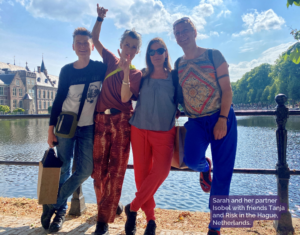

Speak up. Share your thoughts and feelings while looking for spaces that make you feel safe. Identify situations or statements that are poisonous, versus ones that are reassuring and forward-looking. Your intuition is a muscle and must be nurtured to understand what is good for you and what is not. There will be plenty of opportunities to jump into, so don’t be too anxious or cautious. Be a bit more brave while making sure you have somebody at your side.
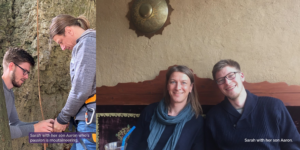

Right now, there are quite a lot of statements about tolerating the LGBTQ+ community. I think we need to be more specific with the language we’re using. We can still ignore what we only tolerate. In my opinion, we need to focus on the journey from tolerance to acceptance and then to respect and alliance.
Inclusion also has an inner and outer journey. The outer one, we all know and see: when people are actively seen and respected for what and who they are, independent of the communities to which they belong. The inner one is hardly seen, but to me it is the more important journey: to respect who people are, to understand where they are coming from, and to give them freedom.

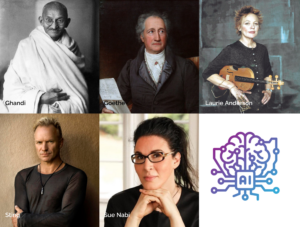
Mahatma Gandhi – I would be curious how he would play diversity and equity in our times.
Goethe – as he did combines so many things in art and humanity, stating that orange belongs to the sound of sax, and orange is my favorite color.
Laurie Anderson – with her “virus” of language.
Sting – who brings on the night before the night, what is his signature of “Yes, I am convinced that this is going to make a change.”
Sue Nabi – I read an article about her in 2011 in a German women’s magazine and never talked to her, although it was good to have her on my imaginary side as a nonbinary/ trans-leader.
Walter Scheels – who ran a photography project of transgender people for many years, willing to understand and picture.
Thomas – a former colleague and big friend, who was the first person I could talk to openly.
My partner Isabel – definitely need her on my side.
And finally any A.I., to listen, to get trained, to not stereotype and reproduce what has happened.

Not an easy question, I would know many throughout my life… but my answer would be “Dreamer” by Supertramp.
“If I could see something
You can see anything you want, boy
If I could be someone
You can be anyone, celebrate, boy”